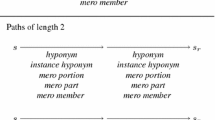Abstract
In this contribution, basic concepts and methods of computational lexicography are introduced as a practically oriented background tutorial to the other more specialised papers, concentrating on lexicon design for use in operational systems, particularly spoken language systems, and with reference to lexical representation rather than the acquisition of lexical information. There are therefore many areas of the large field of computational lexicography which are not touched (though some areas overlap), for example text mining for corpus-based lexicon construction, the construction of lexica for natural language processing (NLP) systems, automatic acquisition of syntactic or semantic information from texts, re-use of machine-readable dictionaries for new lexica, machine-readable dictionaries (MRDs) in general, or computer production of lexica for human use.
Access this chapter
Tax calculation will be finalised at checkout
Purchases are for personal use only
Preview
Unable to display preview. Download preview PDF.
Similar content being viewed by others
References
Papers in this volume
Adda—Decker, Martine and Lori Lamel (this volume). The use of lexica in automatic speech recognition.
Bouma, Gosse, Frank Van Eynde and Dan Flickinger (this volume). Constraint—based lexicons.
Cahill, Lynne, Julie Carson—Berndsen and Gerald Gazdar (this volume). Phonology—based lexical knowledge representation.
Daelemans, Walter and Gert Durieux (this volume). Inductive lexicons.
Draxler, Christoph (this volume). Speech Databases.
Grefenstette, Gregory, Anne Schiller and S. Aït—Mokhtar (this volume). Recognizing lexical patterns in text.
Quazza, Silvia and Henk van den Heuvel (this volume). The use of lexicons in textto—speech systems.
Baayen, Harald, Rob Schreuder and Richard Sproat (this volume). Morphology in the mental lexicon: a computational model for visual word recognition.
Other references
Bleiching, Doris, Guido Drexel and Dafydd Gibbon (1996). Ein Synkretismusmodell für die deutsche Morphologie. In: Dafydd Gibbon, ed., Natural Language Processing and Speech Technology. Berlin: Mouton de Gruyter.
Boguraev, Bran and Ted Briscoe, eds. (1989). Computational Lexicography for Natural Language Processing. London: Longman.
Boguraev, Branimir and James Pustejovsky, eds. (1995). Corpus Processing for Lexical Acquisition. Cambridge, Mass.: MIT Press.
Butler, Christopher S., ed. (1992). Computers and Written Texts. Oxford: Blackwell.
Coward, David F. and Charles E. Grimes (1995). Making Dictionaries: A guide to lex-icography and the Multi—Dictionary Formatter. Waxhaw, North Carolina: Summer Institute of Linguistics.
Cruse, D. A. (1986). Lexical Semantics. Cambridge: Cambridge University Press.
Davis, Daniel W. and John S. Wimbish (1993). The Linguist’s SHOEBOX: User’s Manual Version 2.0. Waxhaw, North Carolina: Summer Institute of Linguistics.
Fillmore, Charles J. (1971). Types of lexical information. In: Steinberg and al. (1971), Semantics: An Interdisciplinary Reader in Philosophy, Linguistics and Psychology.
Cambridge: Cambridge University Press. pp. 370–392.
Garside, Roger, Geoffrey Leech and Anthony McEnery, eds. (1997). Corpus Annota- tion: Linguistic Information from Computer Text Corpora. London: Longman.
Gibbon, Dafydd, Roger Moore and Richard Winski, eds. (1997). Handbook of Standards and Resources for Spoken Language Systems. Berlin: Mouton de Gruyter.
Handke, Jürgen (1995). The Structure of the Lexicon: Human versus Machine. Berlin: Mouton de Gruyter.
Landau, Sidney I. (1989). Dictionaries: The Art and Craft of Lexicography. Cambridge: Cambridge University Press.
Leech, Geoffrey, Greg Myers and Jenny Thomas, eds. (1995). Spoken English on Computer. London: Longman.
Marslen–Wilson, William, ed. (1992). Lexical Representation and Process. Cambridge, Mass.: MIT Press.
Pollard, Carl and Ivan A. Sag (1987). Information–based Syntax and Semantics Volume 1: Fundamentals. Stanford: CSLI.
Pollard, Carl and Ivan A. Sag (1994). Head–Driven Phrase Structure Grammar. Chicago: University of Chicago Press.
Pustejovsky, James (1995). The Generative Lexicon. Cambridge, Mass.: MIT Press Sager, Juan C. (1990). A Practical course in Terminology Processing. Amsterdam/Philadelphia: John Benjamins Publishing Company.
Tomaszczyk, Jerzy and Barbara Lewandowska–Tomasczyk (1990). Meaning and Lexicography. Amsterdam/Philadelphia: John Benjamins Publishing Company.
Wilks, Yorick, Slator, Brian and Guthrie, Louise (1996). Electric Words — Dictionar-ies, Computers, and Meanings. Cambridge, Mass.: MIT Press.
Zampolli, Antonio, L. Cignoni and C. Peters, eds. (1990). Computational Lexicology and Lexicography: Special issue of Linguistica Computazionale dedicated to Bernard Quemada. 2 Vols. Pisa, Giardine.
Editor information
Editors and Affiliations
Rights and permissions
Copyright information
© 2000 Springer Science+Business Media Dordrecht
About this chapter
Cite this chapter
Gibbon, D. (2000). Computational Lexicography. In: Van Eynde, F., Gibbon, D. (eds) Lexicon Development for Speech and Language Processing. Text, Speech and Language Technology. Springer, Dordrecht. https://doi.org/10.1007/978-94-010-9458-0_1
Download citation
DOI: https://doi.org/10.1007/978-94-010-9458-0_1
Publisher Name: Springer, Dordrecht
Print ISBN: 978-0-7923-6369-9
Online ISBN: 978-94-010-9458-0
eBook Packages: Springer Book Archive




